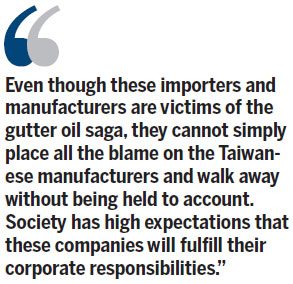Hong Kong needs tougher regulation of food imports
Updated: 2014-09-11 09:03
By Raymond So(HK Edition)
|
|||||||
A major Taiwan oil manufacturer was found to be producing gutter oil. Many restaurants, food manufacturers and hawkers have suffered. Needless to say, this is a huge health issue. Recent developments have also seen Hong Kong implicated in the scandal. Many Hong Kong restaurants import oil, either directly or indirectly, from the Taiwanese oil manufacturer. Some media sources now indicate that this manufacturer has imported low grade oil from Hong Kong to produce the gutter oil. The issue has become complex as the gutter oil network is so large.
From an economic point of view, the use of gutter oil is an indication of how greed in business will evolve if there are no checks and balances. Taiwan is a good example of how improper business ethics can cause harm throughout society. Taiwan used to have a good reputation for food safety; however, this good reputation was only established in the past couple of decades. There was a major gutter oil incident in Taiwan in the mid-1980s. Following this, the government of Taiwan did a lot to prevent the re-emergence of gutter oil. Also, Taiwan expanded its exports to developed markets such as the United States and Europe. These markets implement high food safety standards including strict food import regulations. Such high standards have in turn improved the quality and safety of food produced in Taiwan, enhancing the reputation of Taiwanese food in the export market.
Recent social developments have led to a decline in food safety standards. Food import standards have remained stable in developed markets, so this is not related to any changes in these standards.
Some commentators suggest the economic downturn in Taiwan in recent years is a possible reason for the reoccurrence of improper food safety practices like the use of gutter oil. The income in real terms of the Taiwanese people has declined in recent years. Consumers have become more price conscious. Despite these pressures, restaurants have been unable to raise prices due to competition. When consumers and food manufacturers become more sensitive to costs, an easy solution is to cut corners. The old practice of using gutter oil then emerges. Though this argument appears to be conjecture, it gives rise to a possible solution to improving food safety - stringent regulation.
Unfortunately, Hong Kong does not seem to have a strict system of food safety controls. An excellent document-based control system is possible. However, a food ingredient quality system based solely upon documentary evidence is unsatisfactory.

Food importers and manufacturers also said they "trusted" certificates issued by Taiwanese authorities. But this does not absolve them of their responsibilities to check the quality of the ingredients they imported and used.
If these importers believe simply checking documents can replace random checking and testing, then they are not doing their job properly.
Even though these importers and manufacturers are victims of the gutter oil saga, they cannot simply place all the blame on the Taiwanese manufacturers and walk away without being held to account. Society has high expectations that these companies will fulfill their corporate responsibilities.
From a policy point of view, Hong Kong needs more stringent rules on food imports. The argument is often made that Hong Kong is a small market and we cannot afford to have strict food import regulations, otherwise we would have less choice as many exporters will abandon us. Recent events suggest we can no longer accept this view.
Hong Kong society will continue to call for better food safety regulations. Apart from reliance on moral responsibility, proposals for stricter food safety laws will also be tabled. So, more work lies ahead.
The author is dean of the School of Business at Hang Seng Management College.

(HK Edition 09/11/2014 page10)